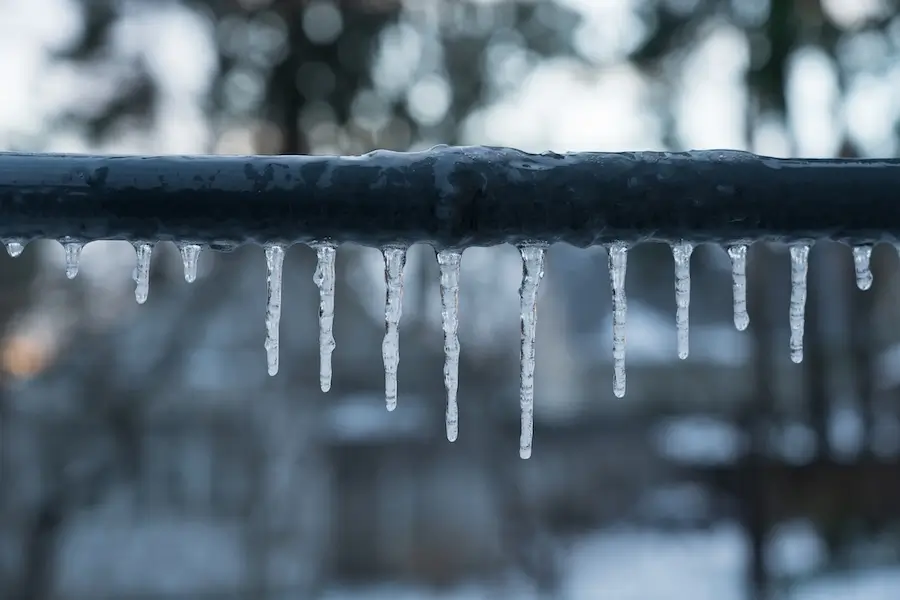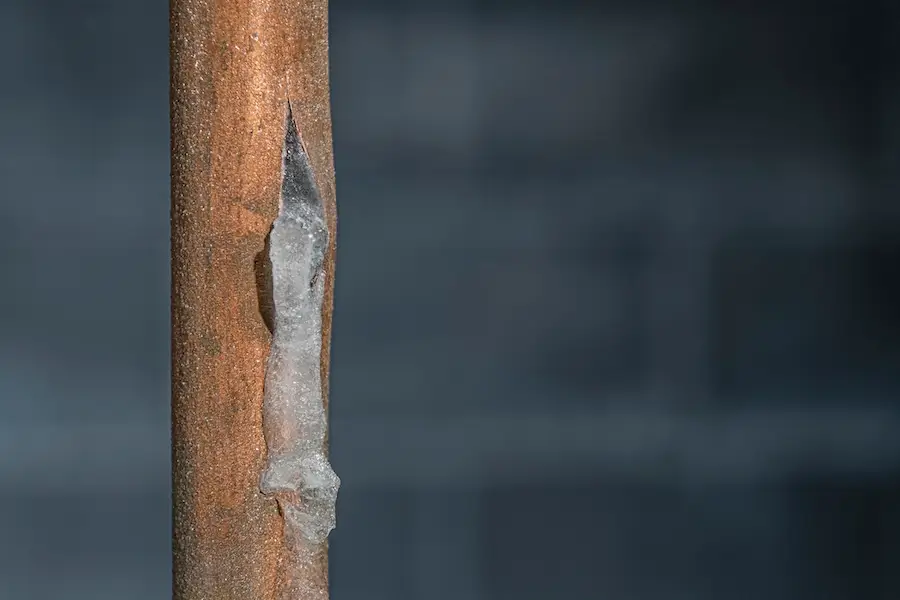
|
Mr. Rooter Plumbing experts explain how to identify frozen pipes quickly to prevent costly damage. Key signs include no water flow, frost or condensation on pipes, bulging areas risking bursts, foul odors from blocked sewer lines, damp patches indicating leaks, and low water pressure. Acting promptly by contacting trusted plumbers can help thaw pipes safely and prevent burst pipe disasters. Regular pipe insulation and awareness reduce freezing risks in winter.
Protect your plumbing in cold weather by recognizing these signs early and consulting Mr. Rooter Plumbing for expert frozen pipe detection and repair services. |
Freezing pipes are a common reality for many homeowners in the heart of winter. All it takes is for the mercury to plummet, and poorly or uninsulated pipes can freeze with water inside them.
While you might know that your pipes are capable of freezing, you may not know how to tell if pipes are frozen. Knowledge is power. If you are able to spot the signs of frozen pipes, you can act quickly to remedy the situation and start enjoying convenient access to water once more!
How to Know If Pipes Are Frozen: 6 Signs
Learning how to tell if your pipes are frozen is easier than you think. Now might be the best time to call a local trusted plumber if you can relate to these signs:
No Water
If you turn on your faucet and have no water or a mere trickle, you likely have a frozen pipe you need to thaw out. A lack of water means it’s frozen inside your pipes, and you won’t have access to water again until it thaws.
Frost and Condensation
If you suspect your pipes are frozen but don’t know for sure, check for frost and condensation. Frost and condensation can be particularly obvious in unheated areas like basements and crawl spaces.
Bulging Pipes
If you’ve noticed that your pipes are bulging, act quickly and contact an emergency plumber without delay. Bulging pipes means water has frozen and expanded inside your pipes, putting them at risk of bursting.
Foul Smells
Foul smells on your property can indicate many plumbing problems, such as a broken sewer line or an issue with your septic system, or drainage. However, it can also be linked to frozen pipes. Foul odors from faucets and drains can sometimes mean that your sewer line is frozen and stopping odors from being able to escape.
Damp Patches
Contact an emergency plumber immediately if you notice damp patches near pipes. This can sometimes mean that a frozen pipe has burst. Alongside contacting your local trusted plumber, you may also like to call your homeowners’ insurance provider to discuss coverage for any damage caused.
Low Water Pressure
How to know if your pipes are frozen can often be as straightforward as noticing water pressure changes. Pay attention to a sudden drop or no water pressure at all.

What to Do About Frozen Pipes
You might know how to tell if pipes are frozen, but do you know what to do about them? If you’re not confident thawing pipes on your own, contact a plumbing professional for help. They can work quickly to thaw your frozen pipes and provide emergency plumbing services for any burst pipes. You can also take these steps:
1. Stop the Water Flow
As soon as you’ve identified frozen pipes, stop the flow of water to your property. Find the main water shut-off valve and turn it off. Once you’ve done that, open any faucets connected to your frozen pipes to relieve pressure.
2. Apply Heat
Your local plumber can help thaw frozen pipes, but you can also tackle this task yourself by applying gentle heat. Try some of these options:
- A hairdryer: Gently warm the pipe, starting from the faucet and slowly moving it towards the frozen area.
- A space heater: Put a space heater near your frozen pipe to thaw it gradually. Refrain from placing it too close.
- Hot towels: Soak towels in hot water and place them around your frozen pipe. Keep replacing them as they cool down.
- An electric heating pad: Wrap an electric heating pad around your frozen pipe to gently warm it up and thaw it out.
Note: Never use open flames or propane torches to defrost your pipes. Gentle, gradual warmth is best!
How to Prevent Frozen Pipes
Knowing how to tell if pipes are frozen is an invaluable skill during the winter months. However, you don’t always have to put up with frozen pipes in the first place. There are a number of ways to prevent them:
Insulate Your Pipes
Pipe insulation is among the best ways to stop your pipes from freezing. There are a number of pipe insulation options to choose from, such as rigid foam, flexible elastomeric foam, and polyethylene. You can also insulate hot pipes with mineral wool insulation and glass wool or fiberglass.
Let Your Faucets Drip
As annoying as it can be to hear dripping faucets, it can be a way to prevent your pipes from freezing in cold weather. Let a small trickle of water flow through your pipes so it’s much harder for the water to freeze.
Keep Your Home Warm
Even if you’re not home, reduce the risk of dealing with frozen or burst pipes by keeping your property warm. Aim to keep it above 55 degrees Fahrenheit.
Open Cabinets
You may be able to prevent pipes from freezing under sinks by leaving your cabinets open. This enables warm air to flow around your pipes.
Protect Your Spigots
As soon as the mercury plummets, disconnect your outside hoses and protect your spigots with foam faucet covers.
Get Help with Frozen Pipes from Mr. Rooter Plumbing®
Are your pipes frozen? Have your pipes burst from being frozen? It’s time to call Mr. Rooter Plumbing®. Our expert plumbers know how to tell if pipes are frozen and can help with thawing them and protecting them from future freezing events. Request a job estimate online or call us today.

